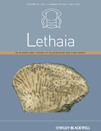
LETHAIA
Scope & Guideline
Bridging Disciplines in the Study of Life's History
Introduction
Aims and Scopes
- Palaeoecology and Environmental Reconstruction:
The journal emphasizes studies that explore how ancient organisms interacted with their environments, using fossil evidence to reconstruct past ecosystems and climate conditions. - Stratigraphy and Biostratigraphy:
Research on stratigraphic relationships and the use of fossils for biostratigraphical purposes is a core focus, providing insights into geological time scales and the relationships between different geological formations. - Taphonomy and Fossil Preservation:
LETHAIA publishes studies that investigate the processes of fossilization and the implications these processes have for interpreting the fossil record. - Morphological and Functional Studies:
The journal covers research on the morphology of ancient organisms and the functional significance of anatomical features, contributing to our understanding of evolutionary biology. - Trace Fossils and Ichnology:
Research on trace fossils, including their formation, significance, and implications for understanding behaviour and ecology of ancient organisms, is a prominent area of interest. - Diversity and Evolution:
The journal explores patterns of biodiversity through geological time, investigating how evolutionary processes have shaped the diversity of life.
Trending and Emerging
- Integrated Stratigraphy and Global Correlation:
There is a growing emphasis on integrated stratigraphic studies that correlate local findings with global geological events, reflecting a trend towards understanding the broader implications of local palaeontological data. - Palaeoenvironmental and Climate Change Studies:
Research exploring the impacts of ancient climate change on biodiversity and ecosystem dynamics is increasingly prevalent, emphasizing the relevance of past events to current environmental challenges. - Technological Innovations in Palaeontology:
The application of advanced technologies, such as micro-CT scanning and X-ray fluorescence, is becoming more common, allowing for detailed analyses of fossils and their contexts that were previously unattainable. - Ecological Dynamics and Biodiversity Shifts:
Papers focusing on shifts in biodiversity and ecological dynamics, particularly during critical transitions in Earth’s history, are emerging as a significant area of interest. - Molecular Palaeontology and Biomarkers:
The incorporation of molecular techniques and the study of ancient biomolecules are gaining traction, indicating a trend towards understanding evolutionary processes at the molecular level.
Declining or Waning
- Palaeobotany and Plant Fossils:
Research focused specifically on plant fossils has decreased, possibly due to a broader shift towards more integrative studies that combine palaeobotany with other biological disciplines. - Invertebrate Palaeontology:
While still a significant area, the number of studies exclusively focusing on invertebrates seems to be waning, with more emphasis now placed on vertebrate palaeontology and broader ecological implications. - Geochemical Analyses in Palaeontology:
Although geochemical studies remain important, there appears to be a reduction in the number of papers focused solely on geochemical analyses of fossils, as the field moves towards more holistic approaches. - Regional Studies:
Papers dedicated to specific regional palaeontological studies, while still valuable, are becoming less frequent as the journal shifts towards more global or comparative analyses.
Similar Journals
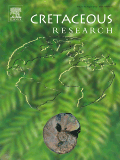
CRETACEOUS RESEARCH
Pioneering Research in Paleontology's Golden AgeCRETACEOUS RESEARCH, published by Academic Press Ltd - Elsevier Science Ltd, is a leading journal in the field of Paleontology that has established itself as an essential resource for researchers and professionals delving into the rich tapestry of the Cretaceous period. With its ISSN 0195-6671 and E-ISSN 1095-998X, this journal boasts a prestigious placement in the academic landscape, holding a Q1 rank in the 2023 Paleontology category and proudly positioned at 21st out of 113 in the Scopus ranking, reflecting its impact factor that places it in the 81st percentile. Since its inception in 1980, CRETACEOUS RESEARCH has facilitated a deeper understanding of prehistoric life and its evolutionary processes, covering topics such as fossil discoveries, paleoecology, and biostratigraphy. This journal best serves those seeking to expand their knowledge and contribute innovative findings to the scientific discourse surrounding the Cretaceous era. As it continues to converge into the future until 2025, it remains dedicated to providing an open platform for the dissemination of high-quality research that shapes our understanding of Earth’s geological past.

PALAEONTOLOGIA ELECTRONICA
Innovating Paleontological Insights for a Sustainable FuturePALAEONTOLOGIA ELECTRONICA is a distinguished open-access journal published by COQUINA PRESS, offering a vital platform for the dissemination of cutting-edge research in the fields of Paleontology and Oceanography. Launched in 1998, this journal has continuously fostered scholarly communication, allowing unrestricted access to scientific findings and contributing significantly to the advancement of the field. With an impressive track record since its inception, PALAEONTOLOGIA ELECTRONICA holds a 2023 Scopus ranking of #39 out of 113 in the Paleontology category, demonstrating its value among academic resources as evidenced by its Q2 quartile ranking. The journal is based in the United States, and it encourages submissions that span a diverse range of topics, from fossil analysis to evolutionary biology. As a prominent resource for researchers, educators, and students alike, it plays a crucial role in shaping the future of paleontological study.
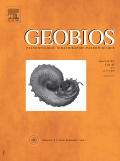
GEOBIOS
Exploring Earth's Past and BeyondGEOBIOS is a prominent academic journal published by Elsevier France-Editions Scientifiques Medicales Elsevier, specializing in the fields of Paleontology, Space and Planetary Science, and Stratigraphy. With a rich publication history dating back to 1966, the journal aims to foster scholarly communication and dissemination of significant research findings among professionals and researchers in earth sciences. Recognized for its impact within the scientific community, GEOBIOS holds a respectable Q2 ranking in several categories, positioning it within the top tiers of scientific journals. Despite its traditional publication format, the journal provides a platform for groundbreaking studies that influence our understanding of both the geological past and future planetary developments. The journal's consistent ranking, including Rank #36 in Paleontology and Rank #59 in Space and Planetary Science, underscores its relevance and significance in its field. GEOBIOS serves as an essential resource for those engaged in the exploration of earth's history and its extraterrestrial counterparts, making it invaluable to researchers, students, and professionals alike.
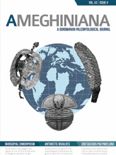
AMEGHINIANA
Unraveling the Mysteries of Evolution and EcologyAMEGHINIANA is a distinguished academic journal published by the ASOCIACION PALEONTOLOGICA ARGENTINA, serving as a vital platform for the dissemination of cutting-edge research in the fields of Ecology, Evolution, Behavior and Systematics, as well as Paleontology. With its ISSN 0002-7014 and E-ISSN 1851-8044, the journal has established itself as a key reference point for scholars seeking to explore the intricate relationships within ecological systems and the evolutionary history of species. Despite not offering open access, AMEGHINIANA maintains a reputation bolstered by a Q3 ranking in both its subject categories, underlining its sustained commitment to enhancing scientific knowledge. Researchers and professionals alike benefit from this journal’s extensive archive of studies dating back to 1985, with ongoing contributions expected until 2024. With a focus on high-quality content, this journal is essential for anyone immersed in the study of paleobiology and ecological systems.

PALAEONTOGRAPHICA ABTEILUNG A-PALAOZOOLOGIE-STRATIGRAPHIE
Advancing Knowledge: Pioneering Research in Paleobiology and StratigraphyPalaeontographica Abteilung A-Palaozoologie-Stratigraphie is a prominent academic journal that serves as a vital resource for researchers in the fields of Paleontology and Stratigraphy. Published by E Schweizerbart'sche Verlagsbuchhandlung in Germany, this journal has been instrumental in disseminating cutting-edge research from 1996 to 2024. With an established reputation highlighted by its Q3 ranking in both Paleontology and Stratigraphy, it ranks 26th among 113 journals in Paleontology and 15th among 55 in Stratigraphy, showcasing its significance within the scientific community. Although it does not currently offer open access, the journal provides an invaluable platform for the exchange of innovative ideas and findings in paleobiological and stratigraphic studies. As such, Palaeontographica continues to attract contributions from leading academics, making it an indispensable publication for professionals and students alike who are eager to advance their understanding of Earth's historical biological and geological patterns.
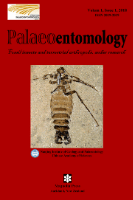
Palaeoentomology
Unlocking Secrets of the Past: The Study of Fossil InsectsPalaeoentomology is a leading journal dedicated to the study of fossil insects, fostering a deeper understanding of historical biodiversity and ecosystem dynamics. Published by MAGNOLIA PRESS, this journal provides an essential platform for researchers, educators, and students interested in entomological paleontology and related disciplines. Featuring a wide range of articles that explore fossil records, evolutionary patterns, and paleoenvironments, it serves the scientific community by enriching our understanding of the past. Although currently not open access, the journal prioritizes rigorous peer-review standards and aims to maintain a high impact factor, ensuring that published research meets the evolving demands of the field. Based in Auckland, New Zealand, it welcomes contributions from both established and emerging scientists worldwide, contributing to a vibrant discourse in the study of ancient insects and their ecological relationships.
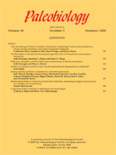
PALEOBIOLOGY
Illuminating the Path from Ancient Ecosystems to Modern SciencePALEOBIOLOGY, published by Cambridge University Press, is a premier, peer-reviewed journal that stands at the forefront of research in paleontological sciences. With a robust commitment to advancing the study of the interactions between ancient life forms and their environments, the journal has established itself as a vital resource for researchers, professionals, and students in the fields of paleontology, ecology, and evolutionary biology. Spanning from 1975 to 2024, it boasts an impressive Q1 ranking in several categories, including Agricultural and Biological Sciences, Ecology, and Paleontology, indicative of its high impact and relevance in shaping contemporary scientific discourse. While the journal is not open access, it offers a variety of subscription and access options, ensuring broad distribution and visibility of published research. As a leader in its discipline, PALEOBIOLOGY aims to facilitate a deeper understanding of our planet's biological history, making it an essential publication for anyone interested in the dynamics of life across geological time.
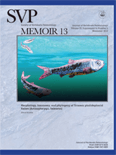
JOURNAL OF VERTEBRATE PALEONTOLOGY
Exploring the Depths of Earth's Ancient FaunaJOURNAL OF VERTEBRATE PALEONTOLOGY, published by Taylor & Francis Inc, is a premier academic journal dedicated to advancing the field of vertebrate paleontology. With a strong emphasis on both traditional and innovative research methods, this journal provides a platform for the dissemination of influential studies and discoveries that shape our understanding of vertebrate evolution and their ecological contexts. Operating under an ISSN of 0272-4634 and an E-ISSN of 1937-2809, it covers research published since 1981 and aims to foster a collaborative environment for researchers, professionals, and students alike. The journal is currently ranked in the Q2 category of Paleontology, standing at position #45 among 113 in its Scopus category, which underscores its significant contribution to the academic community. As a crucial resource for scholars, JOURNAL OF VERTEBRATE PALEONTOLOGY provides insights that not only enrich academic discourse but also stimulate further research and exploration in a field that bridges biology, geology, and conservation.
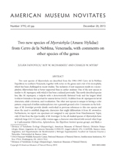
AMERICAN MUSEUM NOVITATES
Connecting Scholars: A Premier Resource for Innovative Research.AMERICAN MUSEUM NOVITATES, published by the American Museum of Natural History, stands as a prestigious platform for scholarly dissemination in the fields of Archeology, History, and Museology. With an impressive impact factor evidenced by its Q1 rankings in 2023 across these categories, this journal is a vital resource for researchers and professionals seeking to advance knowledge and understanding within these disciplines. The journal's commitment to quality research is reflected in its high rankings within Scopus, where it boasts a remarkable rank of #37 in History and #4 in Museology, showcasing its relevance and influence in the academic community. While open access options are not currently available, readers can access compelling research articles that span from its inception in 2005 to the present date, making it an essential reference for those interested in the historical and cultural implications of natural history and museum studies. Located in the heart of New York, this journal fosters a collaboration between scientists and scholars, enriching both academic and public understanding of our shared heritage.

Palaeoworld
Connecting Discoveries to Contemporary Ecological ChallengesPalaeoworld is a leading peer-reviewed journal published by ELSEVIER, focusing on the dynamic and interdisciplinary fields of paleontology, ecology, and stratigraphy. Established in 2006, the journal aims to facilitate the dissemination of innovative research and significant discoveries that enhance our understanding of past life on Earth. With an impressive impact factor and categorized in the second quartile (Q2) for Ecology, Evolution, Behavior and Systematics, Paleontology, and Stratigraphy in 2023, Palaeoworld stands out in its commitment to high-quality scholarship. The journal is indexed in Scopus, ranking #23 in Paleontology and #14 in Stratigraphy, placing it within the top 20% of publications in these categories. As a valuable resource for researchers, professionals, and students alike, it provides unrestricted access to cutting-edge findings, detailed methodologies, and critical assessments of paleo-environmental data. This journal is not only a repository of knowledge but also a platform for advancing discussions that bridge past ecological patterns with contemporary issues.